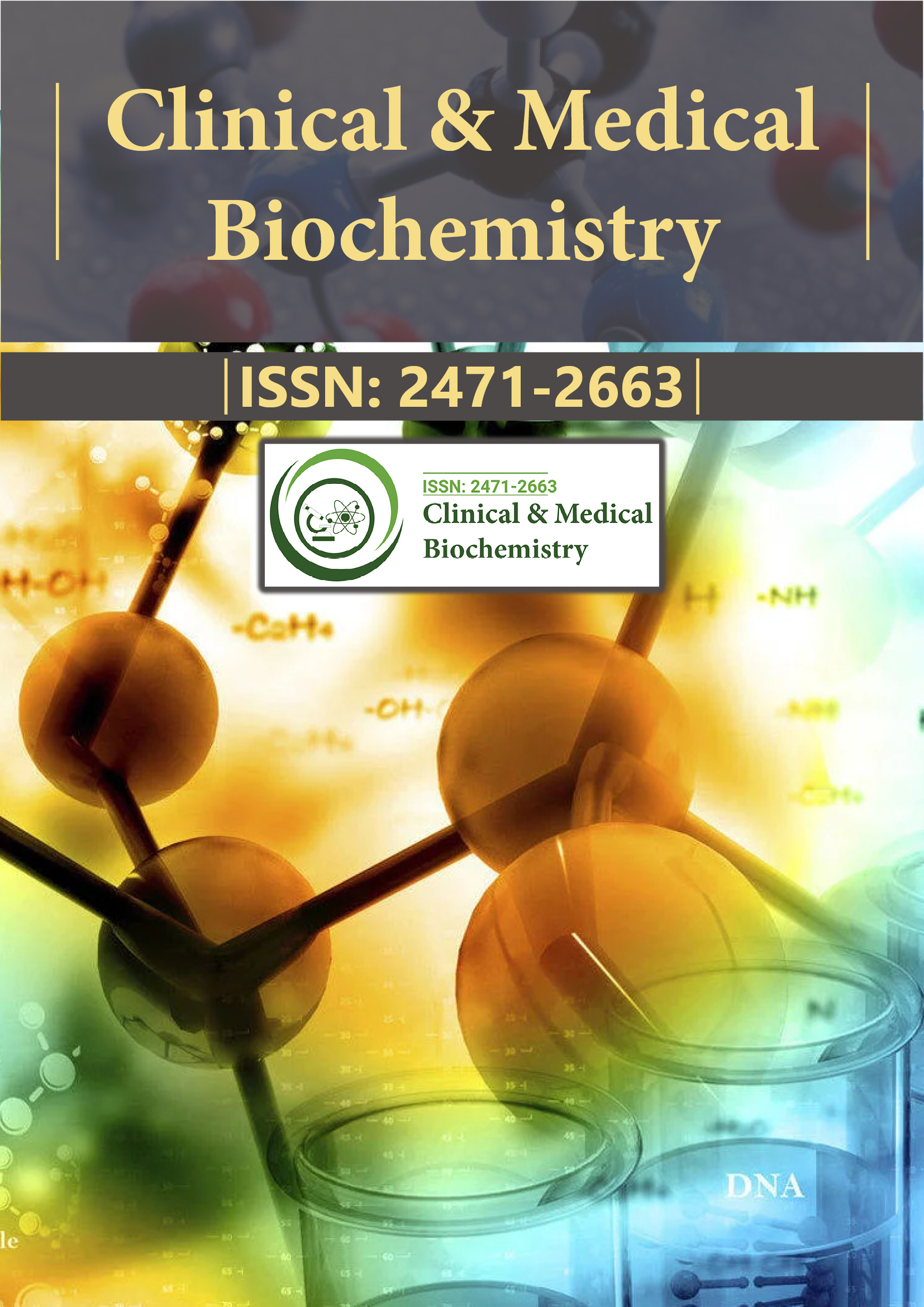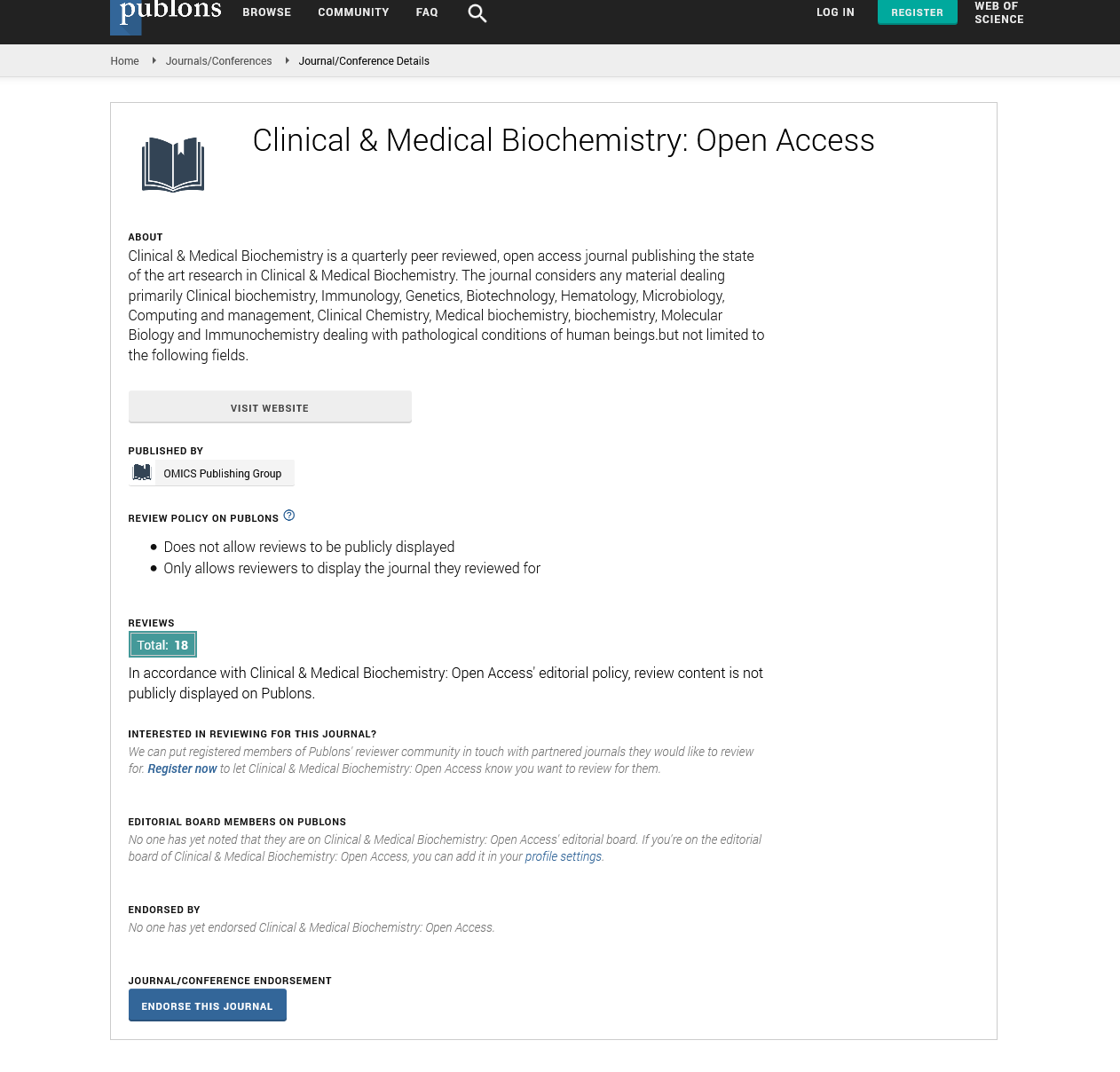Indexed In
- RefSeek
- Directory of Research Journal Indexing (DRJI)
- Hamdard University
- EBSCO A-Z
- OCLC- WorldCat
- Scholarsteer
- Publons
- Euro Pub
- Google Scholar
Useful Links
Share This Page
Journal Flyer

Open Access Journals
- Agri and Aquaculture
- Biochemistry
- Bioinformatics & Systems Biology
- Business & Management
- Chemistry
- Clinical Sciences
- Engineering
- Food & Nutrition
- General Science
- Genetics & Molecular Biology
- Immunology & Microbiology
- Medical Sciences
- Neuroscience & Psychology
- Nursing & Health Care
- Pharmaceutical Sciences
Opinion Article - (2023) Volume 9, Issue 6
Beyond Self-Defense: The Molecular Basis and Diversity of Autoimmune Disorders
Mei Tae*Received: 23-Oct-2023, Manuscript No. CMBO-23-24108; Editor assigned: 26-Oct-2023, Pre QC No. CMBO-23-24108 (PQ); Reviewed: 14-Nov-2023, QC No. CMBO-23-24108; Revised: 21-Nov-2023, Manuscript No. CMBO-23-24108 (R); Published: 28-Nov-2023, DOI: 10.35841/2471-2663.23.9.192
Description
Autoimmune disorders represent a diverse and complex group of conditions where the immune system, typically a vigilant defender against harmful invaders, turns against the body's own cells and tissues. This results in a cascade of misguided immune responses that can lead to chronic inflammation, tissue damage, and a range of symptoms affecting various organs and systems. Considerate the intricacies of autoimmune disorders are essential for effective diagnosis, management, and the on-going search for innovative treatments.
The basis of autoimmunity
The immune system is a finely tuned network of cells, tissues, and organs working in harmony to protect the body from external threats. In autoimmune disorders, this intricate system malfunctions, recognizing the body’s own cells as foreign invaders. This leads to the production of antibodies and immune responses that attack healthy tissues, causing inflammation and damage. The exact cause of autoimmune disorders remains elusive, but a combination of genetic, environmental, and hormonal factors is believed to contribute to their development. Certain individuals may have a genetic predisposition to autoimmune conditions, and environmental triggers, such as infections, medications, or exposure to specific substances, can act as catalysts for immune system dysfunction.
Common autoimmune disorders
Rheumatoid Arthritis (RA): RA is a chronic autoimmune disorder primarily affecting the joints. The immune system mistakenly attacks the synovium—the lining of the membranes surrounding the joints—resulting in inflammation, pain, and eventually joint damage. RA can extend beyond the joints, impacting other organs.
Systemic Lupus Erythematosus (SLE): SLE, or lupus, is a systemic autoimmune disorder where the immune system targets multiple organs, including the skin, joints, kidneys, and brain.
The production of antibodies against the body's own tissues leads to a wide range of symptoms, from joint pain to skin rashes.
Type 1 diabetes: In type 1 diabetes, the immune system attacks and destroys insulin-producing cells in the pancreas. This autoimmune response results in insufficient insulin production, leading to elevated blood sugar levels. Type 1 diabetes often develops early in life.
Multiple Sclerosis (MS): MS is a neurological autoimmune disorder characterized by the immune system attacking the protective covering of nerve fibers. This disrupts communication between the brain and the rest of the body, manifesting in symptoms such as fatigue, difficulty walking, and sensory disturbances.
Hashimoto's thyroiditis: Hashimoto's thyroiditis targets the thyroid gland, leading to inflammation and damage. As a consequence, the thyroid is unable to produce adequate thyroid hormones, causing symptoms like fatigue, weight gain, and sensitivity to cold.
Celiac disease: Celiac disease is triggered by the ingestion of gluten, a protein found in wheat, barley, and rye. The immune system's response damages the small intestine, impairing nutrient absorption and causing symptoms such as digestive issues and fatigue.
Diagnosis and challenges
Diagnosing autoimmune disorders poses challenges due to the diversity and overlap of symptoms. Healthcare professionals employ a combination of clinical assessments, blood tests measuring specific antibodies, imaging studies, and, in some cases, tissue biopsies to establish a definitive diagnosis. One of the challenges in autoimmune disorder diagnosis lies in the variability of symptom presentation. Symptoms can range from mild to severe and may affect different organs and systems in the body. Additionally, the unpredictable nature of these disorders, with periods of remission and flare-ups, adds complexity to the diagnostic process.
Treatment approaches
Managing autoimmune disorders involves a multifaceted approach aimed at alleviating symptoms, controlling inflammation, and preserving organ function. Treatment plans may include: Drugs that suppress the immune system, such as corticosteroids or Disease-Modifying Anti-Rheumatic Drugs (DMARDs), are commonly prescribed to reduce inflammation and prevent further damage. Biologic drugs target specific components of the immune system involved in the inflammatory process. Medications like Tumor Necrosis Factor (TNF) inhibitors have shown efficacy in various autoimmune disorders. For autoimmune disorders affecting hormone-producing glands, such as the thyroid or pancreas, hormone replacement therapy may be necessary to restore proper function. Dietary changes, stress management, and regular exercise are often recommended to support overall well-being and manage symptoms. Advances in precision medicine aim to tailor treatments based on an individual's genetic makeup, allowing for more targeted and effective interventions.
Research and future directions
On-going research in the field of autoimmune disorders is focused on unravelling the complex mechanisms underlying these conditions and developing targeted therapies. The advent of precision medicine, with its emphasis on individualized treatment approaches, capable for more effective and personalized management of autoimmune disorders. Additionally, investigations into the role of the microbiome—the community of microorganisms living in and on the body—in autoimmune disorders are shedding light on the intricate interplay between gut health and immune function. Considerate these connections may open new avenues for therapeutic interventions.
Conclusion
Autoimmune disorders present a multifaceted challenge in the realm of healthcare, affecting millions of individuals worldwide. As our accepting of the immune system and the underlying mechanisms of these disorders deepens, there is hope for more targeted and effective interventions. The collaboration between healthcare professionals, researchers, and patient advocacy groups is essential in navigating the complexities of autoimmune disorders and advancing towards improved outcomes and quality of life for those affected.
Citation: Tae M (2023) Beyond Self-Defense: The Molecular Basis and Diversity of Autoimmune Disorders. Clin Med Bio Chem. 9:192.
Copyright: © 2023 Tae M. This is an open-access article distributed under the terms of the Creative Commons Attribution License, which permits unrestricted use, distribution, and reproduction in any medium, provided the original author and source are credited.

